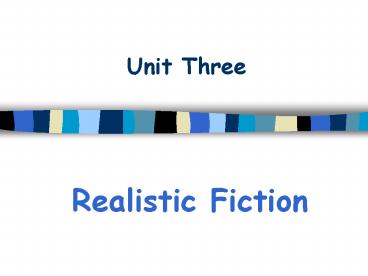Unit Three - PowerPoint PPT Presentation
1 / 25
Title:
Unit Three
Description:
techniques used to achieve particular effects. Alliteration. Dialogue. Hyperbole. Simile. Metaphor. Personification. Imagery. Onomatopoeia. Repetition. Rhyme. Rhythm ... – PowerPoint PPT presentation
Number of Views:26
Avg rating:3.0/5.0
Title: Unit Three
1
Unit Three
- Realistic Fiction
2
Major Concepts and Skills
- Reading Response
- Written
- A5, B10
- Literature Circles
- A21, B14, B15
3
Major Concepts and Skills
- Comprehension
- Monitoring
- Fix-up strategies
- A12
- Summarization
- A13
4
Major Concepts and Skills
- Vocabulary Development
- Structural analysis
- A11
- Multiple-meaning words
- Idioms
- B13
- Precise words
5
Major Concepts and Skills
- Creative Writing/Story
- Writing Process
- Prewriting
- Drafting
- Revising
- Editing/proofreading
- Publishing
6
Major Concepts and Skills
- Grammar
- Irregular verbs
- Comparing with adjectives
- Complex sentences
- Use of I and me
- Conventions
7
Unifying Focus Shared Chapter
Book
- Yang the Youngest and His Terrible Ear
8
Looking at the Lessons
Unit 3 Realistic Fiction
9
Literary Devicestechniques used to achieve
particular effects
- Alliteration
- Dialogue
- Hyperbole
- Simile
- Metaphor
- Personification
- Imagery
- Onomatopoeia
- Repetition
- Rhyme
- Rhythm
10
Poster Presentation
- Learning about cultural diversity
- Oral, group project with visuals
- Tailor to your class
Lesson 1
11
Notebook Writing I dont know what to write
about.
- Ideas for Writing
- Getting ideas from reading
- List
- Just a few words
- Freewriting
- Builds fluency
- Any form, style, content, and purpose
- Consider a classroom chart of ideas
Lesson 2 (4,6,10)
12
Looking at the Lessons
- Lessons 2-7
- What Good Readers Do
- Memorable Language
- Background Knowledge
- Vocabulary
- What Good Writers Do
13
Creative WritingStory Realistic Fiction
- Prewriting
- Variety of forms
- Rereading notebook
- Lists
- Timeline
- Drawings or story board
- Freewriting
Lesson 7
14
Creative WritingStory Realistic Fiction
- Prewriting
- Organize ideas so that a logical progression of
thought is evident both within and across the
paragraphs - Remain focused on the topic (Obj. 1)
15
Creative WritingStory Realistic Fiction
- Drafting (B12)
- Just one step in the process
- Leave space for later revising and editing
- Skip lines
- One side of the paper
- Leave wide margins
- Repeated recopying can turn kids off to writing.
16
Voice (A19)
- Writers fingerprints on the page
- Sounds like the person who wrote it, has life,
and makes the reader feel connected
17
Voice Writing Obj. 1
- To express an individual voice means that the
composition engages the reader by clearly
reflecting the personality of the writer. The
students writing sounds authentic and original
and genuinely expresses the students own
personal viewpoint. When a student responds in a
highly individualistic way, his or her voice is
naturally expressed. On the other hand,
formulaic writing frequently prevents students
from having the opportunity to express their own
voice.
18
Creative WritingStory Realistic Fiction
- Revising (A20)
- Exploding the Moment
- Show, Not Tell
- Strong Lead
Lessons 8 - 12
19
Creative WritingStory Realistic Fiction
- Peer Conferencing (A23, R2)
- Students hear their work
- Students share their work
Writing Objectives 3,4 recognize and correct
errors in organization and development in the
context of peer-editing passages.
Lessons 9,11,12
20
Creative WritingStory Realistic Fiction
- Proofreading/Peer Editing
- Writing Objective 2
- Demonstrates a command of the conventions of
spelling, capitalization, punctuation, grammar,
usage, and sentence structure - Writing Objectives 5,6
- in the context of peer-editing passages.
Lessons 12,13
21
Creative WritingStory - Realistic Fiction
- Publishing
- Written
- Partnering with the art teacher
- Partnering with the computer teacher
- Authors Chair (A24)
Lessons 13,14,15
22
Assessment Opportunities
- Ongoing informal assessment
- Student self-evaluations (B16, B20)
- Poster presentation (B6)
- Reading response (B2, B3)
- Story writing (B11)
- Unit test (A25, B19)
- Other practice activities
23
Bilingual and ESL
- Transadaptations
24
Bilingual Model LessonsSpanish Language Arts
- Similarities
- Differences
Unit 3, Lesson 2 Example
25
ESL Model LessonsEnglish Language Arts
- Similarities
- Differences
Unit 3, Lesson 4 Example































